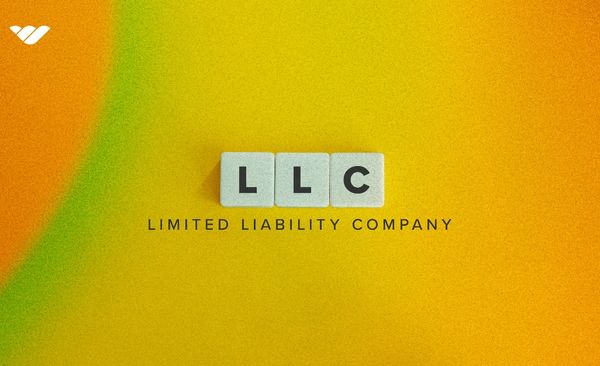In today’s fast-moving world of business, entrepreneurs are almost spoilt for choice when it comes to choosing a legal structure for their ventures. The LLC, or Limited Liability Company, is one of the most popular because it combines the benefits of a corporation with those of partnerships and sole proprietorships, making it a versatile and effective structure that’s also ideal for selling on Whop.
While an LLC is by no means the only structure suitable for a business on Whop, it’s one of the best options and well worth learning about. This guide will break down how an LLC works, what the pros and cons are, and how to establish an LLC in a few easy steps.
How Does an LLC Work?
A Limited Liability Company is designed to offer flexibility in business structure to its owners, who are referred to as “members”. An LLC can have one or more members, and these members can be private individuals, corporations, or other entities. This basic structure offers the same sort of operational simplicity as a traditional business partnership.
As its name suggests, one of the defining features of a Limited Liability Company is the fact that it provides its members with limited liability protection. This can be crucial for entrepreneurs because an LLC shields members’ personal assets from the debts and liabilities of the business itself.
Unlike a corporation, an LLC offers as much flexibility and operational control as members desire. Many members choose to devote a lot of time and energy to their business, taking as active a role as possible in management and operations. Others prefer to delegate by appointing managers, but both styles are equally viable with an LLC.
Pros and Cons of an LLC
Before deciding to establish an LLC, it’s important for a business to weigh its pros and cons along with those of other legal structures before taking a final decision. Here are some of the main things to consider when it comes to an LLC:
LLC Benefits
- Limited Liability: Just like with a corporate structure, an LLC can protect the assets of its members, limiting their liabilities and risk to the extent of investment they put into the company. This is a significant advantage for entrepreneurs since sole proprietorships and partnerships can threaten owners’ finances in the event of their business incurring debt.
- Flexibility: An LLCs structure can be as flexible as members desire, allowing them to take a hands-on approach with regard to their business or appoint managers to oversee its day to day operation.
- Tax Benefits: Choosing an LLC structure can allow a member to benefit from pass-through taxation, where business profits and losses pass through to the members’ personal tax returns. This can be advantageous in several ways, and avoids the double taxation associated with corporations.
- Credibility and Perpetuity: An LLC can lend an entrepreneur’s business more credibility than a sole proprietorship thanks to its formal and established image. It also offers a certain amount of protection in the case of a member’s departure or passing since the business generally continues to exist rather than being dissolved.
LLC Drawbacks
- Self-Employment Taxation: This is the other side of the pass-through tax coin, since LLC members have to pay Social Security and Medicare taxes on their share of the profits earned by the business.
- State-specific Regulations: Different jurisdictions may regulate LLCs differently, which can cause complications. In some states, for example, the lifespan of an LLC can be limited and its existence may end upon the death or departure of a member unless specific provisions are made.
- Compliance: LLCs are formally organized businesses, and therefore must adhere to various administrative and regulatory compliance obligations. Some entrepreneurs may see this as a disadvantage.
How to Establish an LLC
The exact procedure for setting up an LLC may vary depending on jurisdiction, but the general process for doing so follows a set of key steps:
#1. Choose Business Name
While a business name must adhere to the jurisdiction’s guidelines, it is also a unique opportunity to position a business and build a brand. A good business name reflects the identity of the business and is easily distinguishable from others in its niche.
#2. File Articles of Organization
The Articles of Organization are a legal document that every LLC needs, and members can file them with the appropriate state or federal agency in their jurisdiction. This is an important step because it formalizes the creation of the LLC.
#3. Create Operating Agreement
An Operating Agreement is an extremely useful step for a business with multiple members since it formalizes the LLC’s ownership structure and member responsibilities. It also defines voting rights, decision-making processes, and other important considerations that can often lead to conflict down the road if not set in stone via this sort of written agreement.
#4. Obtain Employer Identification Number (EIN)
The EIN, in some cases referred to as the Federal Tax Identification Number, is required for taxation. It plays a similar role to a person’s Social Security number, and is used for various administrative purposes such as opening and managing the business’ bank account(s).
#5. Fulfill State-specific Requirements
It’s important to find out and then fulfill any additional state- or jurisdiction-specific requirements for LLCs such as licenses, permits, or registrations. Many entrepreneurs find it useful to seek professional advice in order to ensure all their bases are covered.
#6. Publish Notice
Some states require entrepreneurs to publish a notice of intent to form an LLC in a local newspaper or periodical. This step is somewhat archaic and often optional, but can raise public awareness about a business.
#7. Pay Fees
The costs to file for an LLC can vary based on jurisdiction, and some states can be a lot cheaper than others to do so. There will invariably be a fee, however, so it’s wise to be prepared to cover the cost.
Taking Your Business to the Next Level with an LLC
Limited Liability Companies are popular with entrepreneurs thanks to their ability to confer strong liability protection as well as the flexibility to operate the business in a manner best suited to their abilities, expertise, and availability. This balance between personal asset security and operational control makes an LLC one of the best legal structures for businesses selling on Whop.
Through a good understanding of the pros and cons of LLCs, along with the specific requirements and constraints in their state or jurisdiction, entrepreneurs can put themselves in the best position to decide whether to establish one or choose another structure. Once that decision has been made, it’s a good idea to work with a legal professional to ensure everything is done properly.
Anyone can create a business and start selling products or services on Whop in minutes, but an LLC can help to take your operation to the next level. If you’re considering establishing one, get in touch with the team at Whop for any help or support you require!
👉 If you’re not already selling your products on Whop, visit the website to get started!





